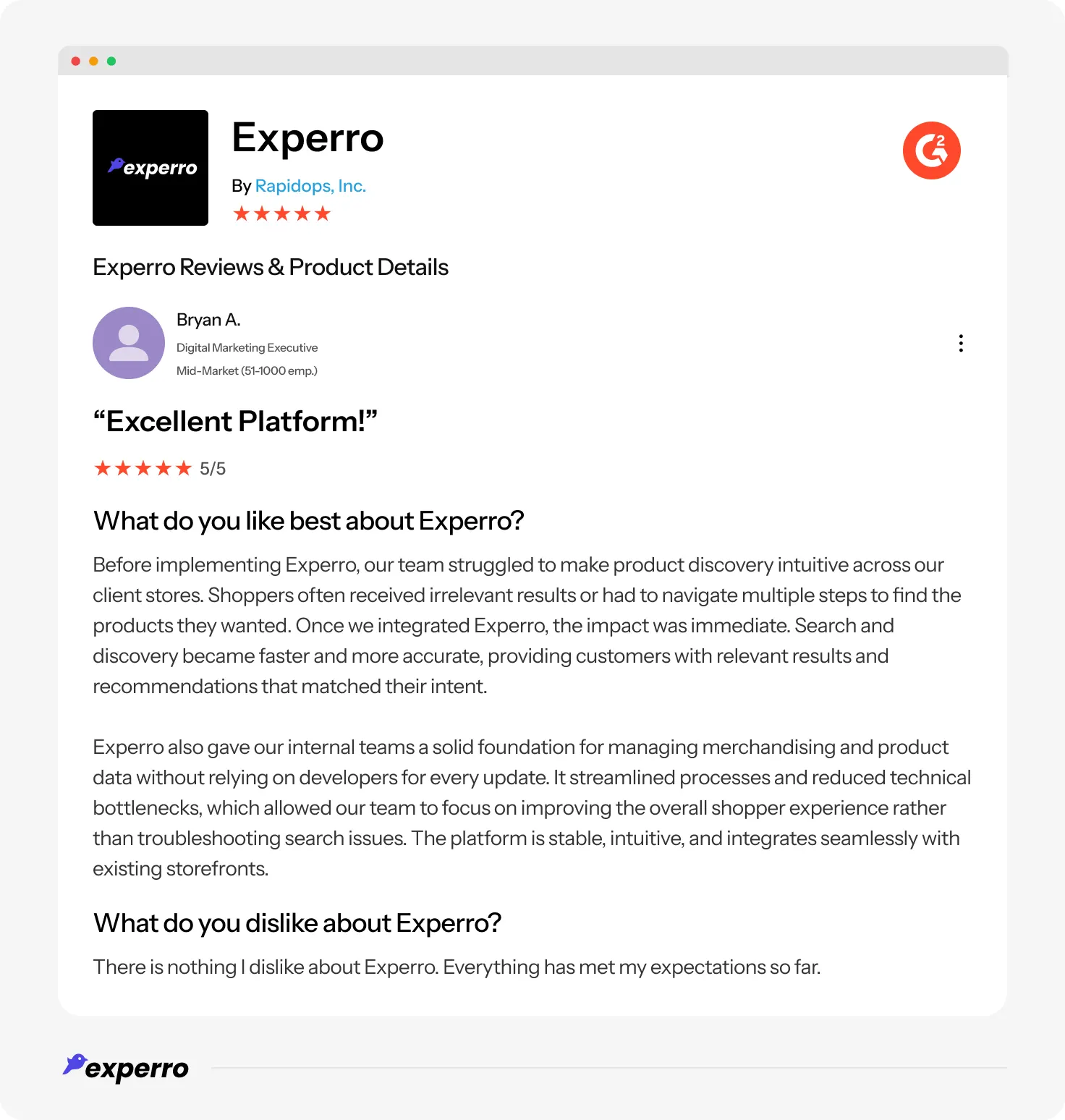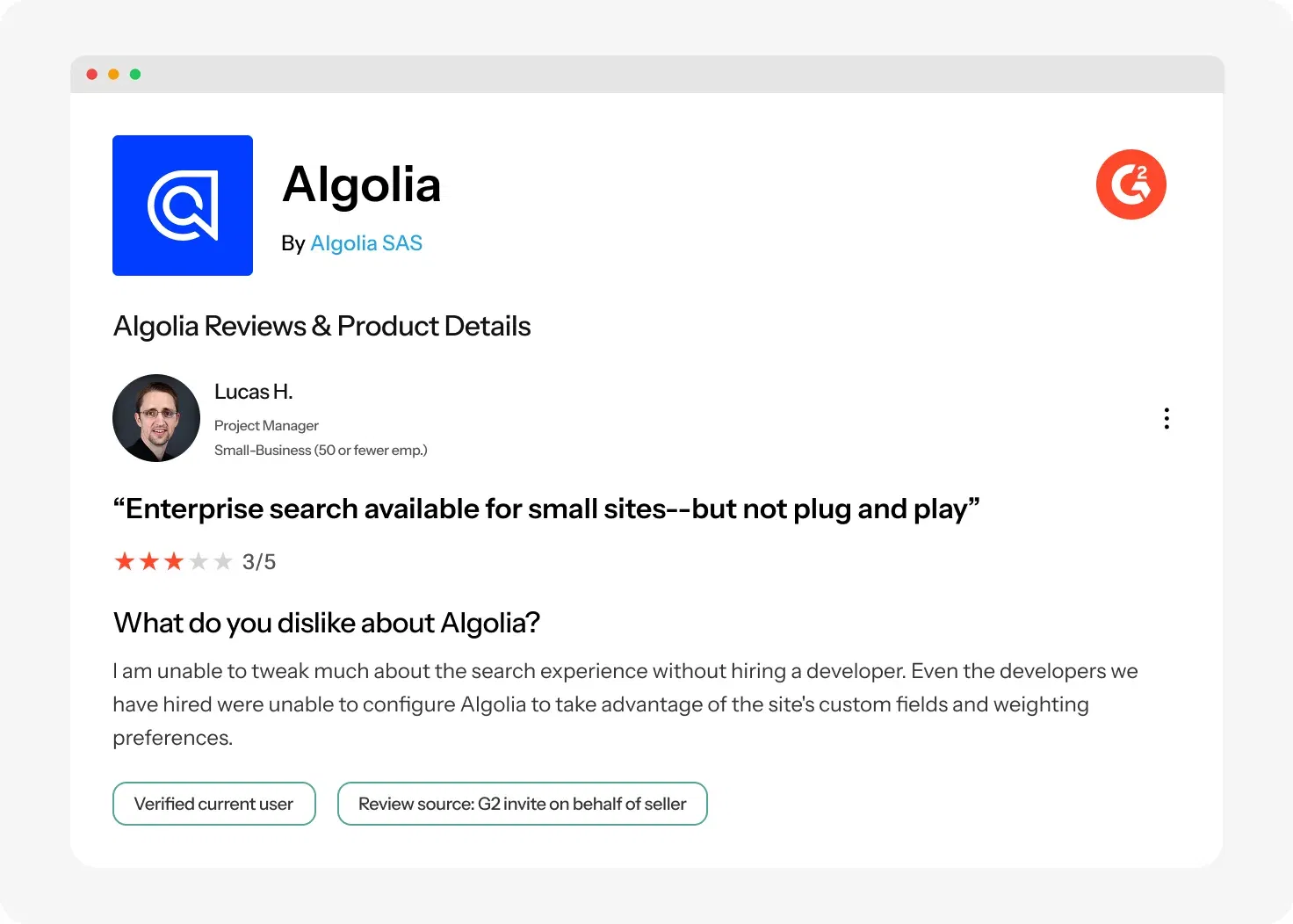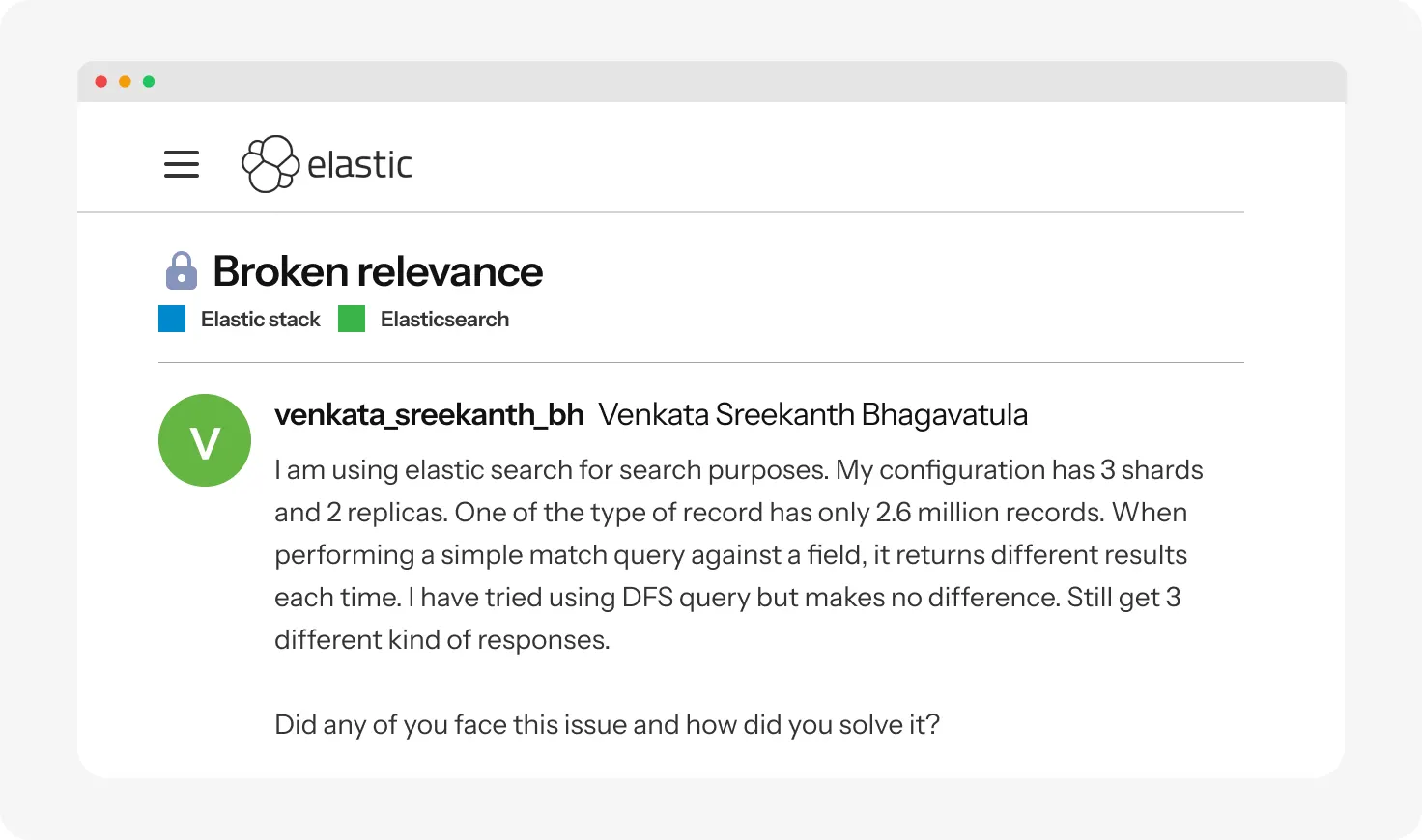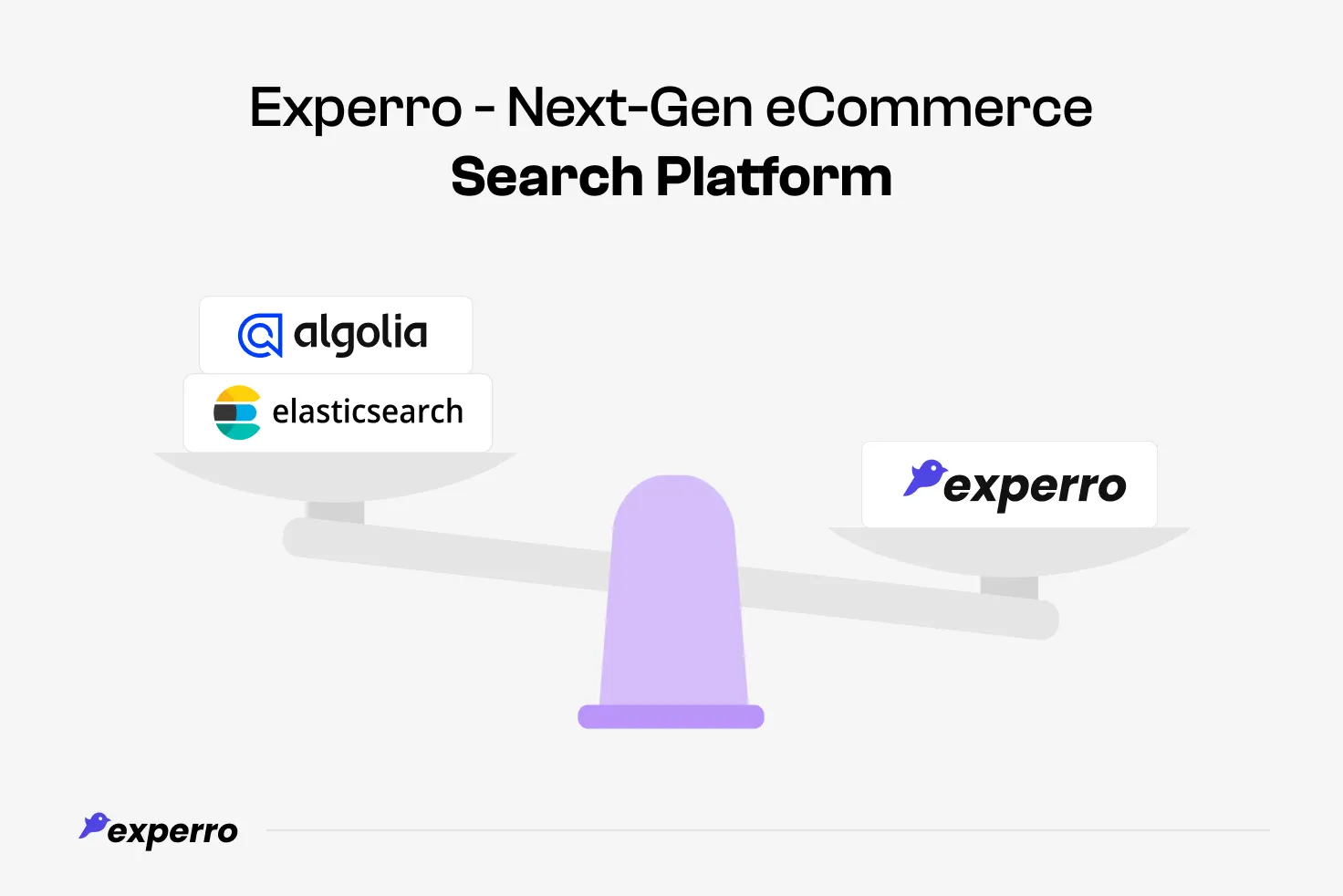Disclaimer - The information in this article is based on publicly available sources, user reviews, and our own research at the time of writing. It is intended for educational and informational purposes only. We encourage businesses to independently evaluate solutions to determine the best fit for their needs.
core insights box
- The Algolia vs Elasticsearch vs Experro comparison highlights which platform truly drives personalization, search performance, and ROI for eCommerce brands.
- Negative reviews from Algolia and Elasticsearch platform users prove that neither of the platforms is fit for the growing eCommerce industry.
- By the end of this guide, you’ll walk away with a clear comparison showing how Experro outperforms Algolia and Elasticsearch by consolidating search, recommendations, and merchandising into one Gen AI-driven platform built for enterprise eCommerce.
Struggling to pick the right search engine between Algolia, Eltasticsearch and Experro to transform your eCommerce store?
You're not the only one, eCommerce brands everywhere are battling for conversions through better search.
When evaluating platforms like Algolia, Elasticsearch, and Experro, the real differentiator isn’t just speed or scale, it’s how intelligently the search engine understands shoppers.
And with generative AI transforming search and agentic eCommerce experiences, the stakes have never been higher.
Let's dive into a complete search platform comparison to help you decide which one fits your online store goals best.
Algolia vs Elasticsearch vs Experro – Individual Overviews
When evaluating Algolia vs Elasticsearch vs Experro enterprise search comparison, it's essential to understand their core strengths, limitations, and how they cater to eCommerce needs individually.
Below is a breakdown to help you compare Algolia and Elasticsearch and Experro on a fundamental level.
1. Algolia

Algolia is known for its lightning-fast search and relevance tuning that performs complex queries. It's a hosted search-as-a-service platform that's easy to integrate and offers a decent degree of customization.
However, for mid to large eCommerce brands, its limitations start to show. Pricing quickly escalates as your data grows, and essential features like visual merchandising and editing tools are often missing.
In the Algolia search vs Elasticsearch vs Experro search, Algolia falls short on personalization and deep data control. Many brands end up looking for Algolia alternatives or pairing it with other tools to fill gaps, adding to operational complexity and hidden costs.
Struggling with Algolia’s rising costs and limited flexibility?
Experro is certainly a smarter choice! See the differences side-by-side!
2. Elasticsearch

Elasticsearch is an open-source search engine widely used for its flexibility and scalability. It’s developer-friendly and ideal for custom search logic.
But it’s also self-managed, which means you’ll need technical teams to set it up, monitor it, and keep it running smoothly. As your catalog and traffic grow, maintaining Elasticsearch becomes costly in terms of both infrastructure and engineering time.
In the Elasticsearch vs Algolia vs Experro comparison, Elasticsearch offers raw power, but lacks an intuitive interface, AI search features, and ready-to-use merchandising tools.
This makes Elasticsearch less ideal for marketers and merchandisers who want to drive product discovery without relying heavily on engineers.
3. Experro

Experro is a one-of-its-kind Gen AI–native platform that’s redefining how brands deliver eCommerce search, product discovery, and content experiences, hyper-personalised for each shopper and auto-optimised to drive sales, conversions, and key business KPIs
Unlike Algolia and Elasticsearch, Experro offers:
- Gen AI-Powered eCommerce Search - Deliver personalized search experiences from the first click!
- Fuzzy search for typo tolerance - Corrects spelling mistakes and returns accurate results even with errors.
- Conversational search - Deliver accurate results for human-like queries like 'suggest me a red top for Valentine's under $100'.
- Semantic search - Interprets meaning and context to deliver more relevant product results.
- Natural language search - Allows users to search using everyday language.
- Predictive search - Anticipates user intent and suggests results as they type.
- Search autocomplete - Speeds up search by offering real-time, relevant query suggestions.
- Multimodal search - Enables search using text, voice or images for a richer, more flexible experience.
- AI Merchant Intelligence Dashboard - Intuitive tools and real-time insights in one centralized dashboard so merchandisers can act in real-time, not days!
Experro outshines Algolia vs Elasticsearch vs Experro comparison for features like real-time user behavior tracking (first-party) and impeccable search capabilities.
Plus, it’s a fully managed searchandising platform, meaning no DevOps headaches and better cost predictability. In short, it’s a platform that empowers both marketing and product teams to experiment, optimize, and grow.
Jax&Brown boosted fashion conversions by 192%
Learn how Gen AI-powered search drove higher engagement and sales

Experro vs Algolia vs Elasticsearch: What Are Users Really Saying About Their eCommerce Search Experience?
Choosing the right search technology can make or break your eCommerce experience. These Algolia vs Elasticsearch vs Experro reviews provide a real-world look at what users love and where they struggle.
Here's how these three platforms stack up in terms of performance, flexibility, and value.
1. Experro’s Review on G2

Bryan praises Experro as an intuitive, all-in-one platform that’s ideal for managing eCommerce websites. He highlights its AI-powered search that reduces zero-result pages and improves product discoverability by understanding user intent.
He also appreciates how it simplifies content updates without coding skills and gives marketers more control. Bryan reports no dislikes about the platform.
Source - G2 Review
2. Algolia’s Review on G2

Lucas points out that configuring the search experience requires a developer, making it less accessible for non-technical users.
Despite its enterprise level search functionality, it lacks a true eCommerce plug-and-play setup and needs external support for customization.
Source - G2 Review
3. Elasticsearch’s Review on Discuss Elastic

The user reports inconsistent search results in Elasticsearch, despite using 3 shards and 2 replicas for a dataset of 2.6 million records.
Even after applying DFS query techniques, the search still returns three different types of results for the same query.
This inconsistency raises concerns over Elasticsearch’s relevance scoring in real-world use cases and makes many users consider alternatives to Elasticsearch for more reliable results.
Source - Discuss Elastic
Feature Comparison: Elasticsearch vs Algolia vs Experro
Before you make a decision, let’s dig deeper into the comparison between Algolia vs Elasticsearch vs Experro across multiple dimensions.
Here’s how Algolia, Elasticsearch, and Experro stack up feature by feature, giving you clarity on which platform drives the best results for your shoppers.
| Basis of Difference | Algolia | Elasticsearch | Experro |
|---|---|---|---|
| Speed & Search Relevance | Fast with manual tuning | Fast, requires configuration | ✅ Ultra-fast with vector + handles complex keyword search query |
| AI-Powered Search | Limited | Not built-in | ✅ Native generative AI search |
| Merchandising Tools | Add-on needed | Not available | ✅ Built-in visual merchandising studio |
| Personalization | Manual & rule-based | Requires custom setup | ✅ Real-time, behavior-aware personalization |
| CMS Integration | External CMS required | External CMS required | ✅ Built-in headless CMS |
| Analytics & Insights | Basic | Requires plugins | ✅ Unified product, user & performance analytics |
| Ease of Use for Marketers | Moderate | Low | ✅ High – No-code, visual editors |
| Developer Dependence | Moderate | High | ✅ Low |
| Pricing Structure | Data analysis + usage-based, unpredictable | Infrastructure + DevOps heavy | ✅ Flat-rate, transparent pricing |
| Deployment Time | Short period | Long period | ✅ Fast with pre-built integrations |
| Scalability | Good but expensive | Scalable with effort | ✅ Auto-scalable, fully managed |
| Maintenance Overhead | Low (but rising with features) | High | ✅ Zero – fully managed |
| Migration Support | Limited | DIY | ✅ Fully supported migration from Algolia/Elastic to Experro |
Based on this eCommerce search engine comparison, it’s clear that Experro outperforms both Algolia and Elasticsearch.
From search relevance to personalization, ease of use, and scalability, Experro leads in every critical area.
It offers a more complete, Gen AI-powered, and commerce-ready solution.
Dump Algolia & Elasticsearch and 'double up' your ROI
Book a personalized demo for your e-store and let us walk you through the features!
What Gives Experro an Edge Over Algolia and Elasticsearch for eCommerce Brands?

At the core, the difference between Elasticsearch vs Algolia vs Experro is who and what they serve. Experro is purpose-built for eCommerce entrepreneurs.
Marketers need agility, merchandisers demand control, and product teams expect performance.
Experro outperforms Algolia and Elasticsearch by meeting all three needs seamlessly, through a unified platform that’s built for speed, scalability, and intelligence.
✅ 3 Things Experro Has (That Algolia & Elasticsearch Don't!)
Here are three major capabilities that Experro offers. Those are its strengths over the other two platforms in consideration:
1. Gen AI-Powered Search with Built-In Personalization
Done with rules, plugins, and guesswork? Experro delivers intelligent, ready-to-go search that understand your users from day one.
Experro’s gen AI-powered search that adapts to each user’s intent in real time; no plugins or external models required.
Unlike Algolia, which relies on manual rules, or Elastic enterprise search, which needs custom development for personalization, Experro learns from user behavior and instantly adjusts results to improve conversions.
2. Visual Merchandising
Most merchandisers like you struggle with scattered tools, but Experro gives you everything you need in one place to take full control.
With Experro, you get intuitive visual merchandising tools that let you control product placements and highlight promotions without relying on external apps or writing a single line of code.
Unlike Algolia and Elastic, which require third-party merchandising solutions and manual setups, Experro offers a seamless experience that connects eCommerce merchandising with real-time user behavior to drive sales.
3. Gen AI Recommendations
Experro includes built-in product recommendations engine that adapt to each user’s behavior, showing the right products at the right time across homepages, PLPs and carts. No need for third-party engines or custom integration.
Algolia and Elasticsearch don’t offer native recommendations, often requiring external tools or in-house development to deliver personalized product suggestions. This can slow down implementation and add cost.
These three core capabilities make one thing clear that Experro is more than a replacement, it’s built to move your eCommerce forward.
Conclusion
Choosing between Experro vs Elasticsearch vs Algolia comes down to your priorities: speed, control, cost-efficiency, or AI-driven personalization.
While Algolia and Elasticsearch serve specific use cases well, Experro brings everything under one roof for modern eCommerce business objectives.
From merchandising to personalization to search analytics, Experro is redefining what advanced search AI capabilities can do. If you're looking to future-proof your eCommerce experience, it's time to explore smarter options.
Connect with our experts on a call for a personalized walkthrough and pricing breakdown.
FAQs
Cost vs ROI: Algolia, Elasticsearch, or Experro?
Experro delivers higher ROI with lower TCO (Total Cost of Ownership). Unlike the Algolia vs Elasticsearch vs Experro pricing models that depend on usage or search infrastructure, Experro’s has no hidden charges which is ideal for scaling eCommerce teams.
How does pricing compare between Algolia, self-managed Elasticsearch, and Experro?
Algolia becomes expensive with growing dataset. Elasticsearch involves ongoing DevOps and hosting costs. Experro stands out in the Algolia vs Elasticsearch vs Experro pricing debate with its customizable effective pricing model. Check Experro pricing now!
How easy is it to migrate from Algolia or Elasticsearch to Experro?
Experro offers full onboarding and data migration support. Whether you're looking to switch from Elasticsearch to Experro or move from Algolia to Experro, the transition is seamless with pre-built connectors.
What are the hidden costs in maintaining Algolia or Elasticsearch?
Algolia’s pricing is usage-based, so costs can add up quickly. Elasticsearch demands high engineering and infrastructure investments. Both require add-ons for personalization and search platforms which you might not know of in the beginning.
What limitations do eCommerce teams face with Algolia or Elasticsearch that Experro solves?
Algolia and Elasticsearch were built for developers, not for fast-moving commerce teams. That’s where the cracks start to show.
- Algolia’s platform offers limited flexibility for end-to-end campaign execution, often requiring workarounds or third-party tools to align content and product strategy.
- Elasticsearch demands constant technical support, making even basic changes to search behavior a dev task.
Experro removes these bottlenecks by:
- Giving teams full control over search relevance, logic, tuning, and personalization, without relying on engineering cycles.
- Unifying search, content, and data-driven decision-making into a single interface.
- Providing automation and AI assistance that evolves with your shoppers, so you’re always delivering optimized search experiences without manual effort.
With Experro, eCommerce teams finally get the autonomy, speed, and intelligence they need to act faster and convert more.
Algolia vs Elasticsearch vs Experro: Which is better for eCommerce?
Here's the deal: Algolia offers speed with feature limits and high costs; Elasticsearch offers power but demands a dedicated DevOps team. When it comes to Gen AI-driven search and product discovery, one consistently comes out on top. (Spoiler alert: it's Experro.)
Pallavi Dadhich
Content Writer @ ExperroPallavi is an ambitious author recognized for her expertise in crafting compelling content across various domains. Beyond her professional pursuits, Pallavi is deeply passionate about continuous learning, often immersing herself in the latest industry trends. When not weaving words, she dedicates her time to mastering graphic design.
What's Inside
- Algolia vs Elasticsearch vs Experro – Individual Overviews
- Experro vs Algolia vs Elasticsearch: What Are Users Really Saying About Their eCommerce Search Experience?
- Feature Comparison: Elasticsearch vs Algolia vs Experro
- What Gives Experro an Edge Over Algolia and Elasticsearch for eCommerce Brands?
- ✅ 3 Things Experro Has (That Algolia & Elasticsearch Don't!)
- Conclusion
Subscribe to Our Newsletters
Get the latest insights delivered straight to your inbox.



